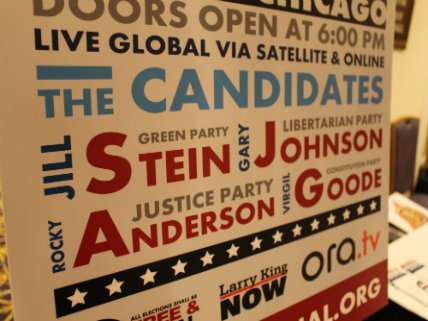Victory for Third-Party Ballot Access in Georgia
A federal appeals court in Atlanta upheld last year's ruling that Georgia ballot access laws violated the Constitution.


Third parties have a reason to rejoice, at least in Georgia. The 11th U.S. Circuit Court of Appeals yesterday upheld a ruling that a portion of the Georgia ballot access law violated the U.S. Constitution. The Atlanta Journal-Constitution reports that a three-judge panel unanimously sided with U.S. District Judge Richard Story, who had previously lowered the number of signatures required for third-party candidates to get on the ballot from tens of thousands to 7,500.
Back in 2012, the Georgia Constitution Party and the Georgia Green Party sued the state, claiming that the requirement to obtain 1 percent of registered voters' signatures was artificially high. The year they sued, the third parties would have needed at least 50,334 signatures to gain ballot access. Thanks to Story, that number was greatly reduced last year.
State officials decided to appeal his decision, arguing that parties must show a "modicum of support" or risk resulting in voter confusion and a crowded presidential ballot. But the panel of judges sided with the parties.
Laughlin McDonald, the Director-emeritus of the American Civil Liberties Union's Voting Rights Project, praised the court's ruling. "I think it's a great decision," McDonald told the AJC. "The state put up no evidence whatsoever as to voter confusion or ballot overcrowding."
A spokesperson for Georgia Secretary of State Brian Kemp, who oversees elections, stated that he and his team are reviewing their options. According to the AJC, if the state does appeal, it will likely ask all 11 members of the 11th Circuit Court to review the decision.
Third parties have been gaining more mainstream pull lately, in part due to last year's presidential election that saw two of the most disliked candidates of all time pitted against each other. Ballotpedia found that as of April 2016, the Libertarian Party is recognized by 33 states, while the Green Party is recognized by 21 and the Constitution Party by 15. Yet third parties still face arbitrary restrictions in many states. Ohio is just one place where third parties have continuously fought for ballot access with limited to no success.
As Reason Senior Editor Brian Doherty explained back in January, Ohio forced Gary Johnson, the Libertarian Party's presidential candidate in 2016, to appear on the ballot as an independent rather than with his proper party title. "Johnson got 3.17 percent of the Ohio vote, which would normally, in Ohio law, qualify the party who got it for ballot access, and the ability to have a ballot primary, next time around," he wrote. "However, according to an opinion from the Ohio Supreme Court last week, Johnson's vote total doesn't count for the L.P.'s future ballot access since the state wouldn't let him on the ballot with his Party identification."
In happier news, this week a federal judge ruled against the Federal Election Commission (FEC) in the case Level the Playing Field et al v. FEC. Judge Tanya S. Chutkan of the U.S. District Court in Washington, D.C., held that the rules that currently govern participation in the presidential election are unfair. See a deeper look at that case, also from Doherty, here.
